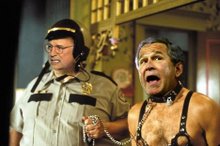The Federalist Papers Speak To "Free" Market, Ethics, Profits, War....
Excerpt:
Has commerce hitherto done anything more than change the objects of war? Is not the love of wealth as domineering and enterprising a passion as that of power or glory? Have there not been as many wars founded upon commercial motives since that has become the prevailing system of nations, as were before occasioned by the cupidity of territory or dominion? Has not the spirit of commerce, in many instances, administered new incentives to the appetite, both for the one and for the other?
Let experience, the least fallible guide of human opinions, be appealed to for an answer to these inquiries.
--- Sparta, Athens, Rome, and Carthage were all republics; two of them, Athens and Carthage, of the commercial kind. Yet were they as often engaged in wars, offensive and defensive, as the neighboring monarchies of the same times. Sparta was little better than a well-regulated camp; and Rome was never sated of carnage and conquest.
Carthage, though a commercial republic, was the aggressor in the very war that ended in her destruction. Hannibal had carried her arms into the heart of Italy and to the gates of Rome, before Scipio, in turn, gave him an overthrow in the territories of Carthage, and made a conquest of the commonwealth.
Venice, in later times, figured more than once in wars of ambition, till, becoming an object to the other Italian states, Pope Julius II. found means to accomplish that formidable league, which gave a deadly blow to the power and pride of this haughty republic.
The provinces of Holland, till they were overwhelmed in debts and taxes, took a leading and conspicuous part in the wars of Europe. They had furious contests with England for the dominion of the sea, and were among the most persevering and most implacable of the opponents of Louis XIV.
In the government of Britain the representatives of the people compose one branch of the national legislature. Commerce has been for ages the predominant pursuit of that country. Few nations, nevertheless, have been more frequently engaged in war; and the wars in which that kingdom has been engaged have, in numerous instances, proceeded from the people.
There have been, if I may so express it, almost as many popular as royal wars. The cries of the nation and the importunities of their representatives have, upon various occasions, dragged their monarchs into war, or continued them in it, contrary to their inclinations, and sometimes contrary to the real interests of the State. In that memorable struggle for superiority between the rival houses of Austria and Bourbon, which so long kept Europe in a flame, it is well known that the antipathies of the English against the French, seconding the ambition, or rather the avarice, of a favorite leader, protracted the war beyond the limits marked out by sound policy, and for a considerable time in opposition to the views of the court.
The wars of these two last-mentioned nations have in a great measure grown out of commercial considerations,—the desire of supplanting and the fear of being supplanted, either in particular branches of traffic or in the general advantages of trade and navigation.
From this summary of what has taken place in other countries, whose situations have borne the nearest resemblance to our own, what reason can we have to confide in those reveries which would seduce us into an expectation of peace and cordiality between the present confederacy, in a state of separation? "Or that business leaders will be compelled to behave ethically due some benevolent force that emanates from the "free" marketplace? A force whose radiant strength appears to be wholly determined by the lack of regulations over which the health and safety of the consumer limits the ability of CEOs monopolize markets, manipulate stock or use other price-fixing measures, all of which which, although extremely non-intuitive, really only serves to weaken the market's ability to reward us all via it's previously mentioned ethics-maximizing guiding force ?Cont... "Have we not already seen enough of the fallacy and extravagance of those idle theories which have amused us with promises of an exemption from the imperfections, weaknesses and evils incident to society in every shape? Is it not time to awake from the deceitful dream of a golden age, and to adopt as a practical maxim for the direction of our political conduct that we, as well as the other inhabitants of the globe, are yet remote from the happy empire of perfect wisdom and perfect virtue?
Powered by ScribeFire.
